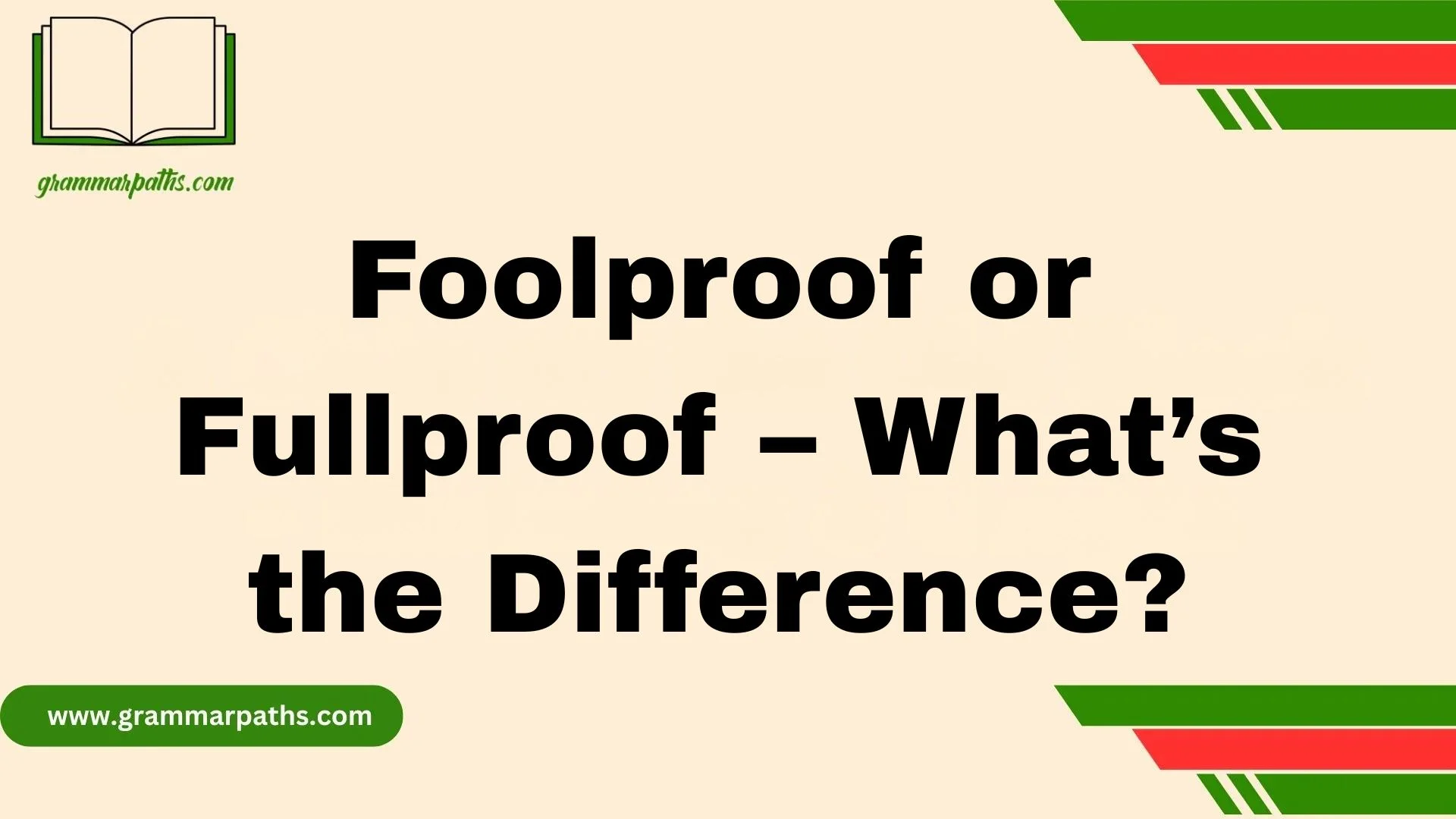The confusion between foolproof and fullproof is something many native English speakers still face, especially when writing important documents like an email or formal plan. Both terms may sound similar, and that’s why they’re considered homophones, but only one is found in standard English dictionaries.
That’s foolproof—a compound adjective formed by joining “fool” and “proof,” similar to how “flowerpot” joins “flower” and “pot.” Think of it like a bulletproof vest—just as a vest is designed to resist bullets, something foolproof is built to resist fools. It’s meant to be invulnerable, uncommon, and so reliable that even someone who might mess up won’t cause problems. Using fullproof, on the other hand, is simply a misspelled version that doesn’t exist in any recognized dictionary.
As someone who’s spent years editing and teaching English, I’ve literally seen this common error show up in classroom documents, marketing plans, even in social media comments. It’s easy to see how the mistake happens—both terms feel logical. “Full” implies completeness, right? But that’s where the mix-up causes confusion. Many people just guess and hope it’s right, but that can lead to an embarrassing slip-up, especially in a professional setting or a social gathering.
The correct term “foolproof” shows precision, understanding of proper terminology, and strong language skills. It’s these subtle differences in usage, spelling, and context that define effective communication. Using the right word isn’t just about grammar—it’s about clarity, accuracy, and showing respect for the English language.
Let me give you a personal example. A friend once created a DIY guide on how to build a makeshift greenhouse. She called it a “fullproof garden plan” in her description. Despite the detailed methods and step-by-step instructions, readers stumbled over that one phrase. It sparked comments, questioned her language rules, and distracted from the otherwise great product. A simple spelling change—foolproof instead of fullproof—would’ve made all the difference.
That one word choice can shape how your work is seen. Whether you’re trying to save face or avoid a mix up, knowing the definition, choosing the correct term, and applying it with confidence matters. Words aren’t just symbols—they’re tools for building understanding, just like a well-made flowerpot supports the roots of a plant.
What Does “Foolproof” Really Mean?
At its core, foolproof means something so simple, clear, or well-designed that even a fool cannot fail to use or understand it. It’s a term often used to describe instructions, methods, devices, or plans that are reliable, safe, and error-proof.
Origin and Etymology
The word foolproof first appeared in the early 20th century. It combines fool — a person lacking judgment or sense — and proof — meaning resistant or impervious to. Put together, it suggests something immune to failure, even by the clumsiest or least knowledgeable person.
According to Merriam-Webster, foolproof is defined as:
“So simple or well designed as to leave no opportunity for error, misuse, or failure.”
Oxford English Dictionary also confirms this usage, showing the term’s solid place in modern English.
Foolproof in Action: Real Examples
- “This recipe is foolproof; anyone can make it perfectly the first time.”
- “We designed a foolproof system to prevent data breaches.”
- “The software update includes a foolproof backup feature.”
In each case, foolproof emphasizes ease, reliability, and error prevention.
The Myth of “Fullproof” — What’s Going On?
You might have seen or even used fullproof before. It sounds logical — after all, “full” means complete or whole. But here’s the kicker: fullproof is NOT a real word in English.
Why People Use “Fullproof”
- Sound-alike confusion: “Foolproof” and “fullproof” sound very similar, especially when spoken fast.
- Misleading logic: People assume “fullproof” means “completely proofed,” which makes intuitive sense but isn’t correct English.
- Typo and autocorrect: Sometimes, spellcheck changes “foolproof” to “fullproof,” or users type it mistakenly.
The Reality
- Fullproof does not exist in dictionaries like Merriam-Webster or Oxford.
- Searching Google shows many incorrect results using “fullproof,” often in informal writing or social media posts.
- Using “fullproof” can hurt your credibility, especially in academic or professional settings.
Here are some examples to avoid:
- Incorrect: “We need a fullproof plan for the project.”
- Correct: “We need a foolproof plan for the project.”
Pronunciation vs Spelling: How Sound Confuses Us
The confusion between foolproof and fullproof is a classic case of pronunciation influencing spelling. English has many words that sound alike but are spelled differently—homophones and near-homophones.
Why Pronunciation Leads to Spelling Errors
- Unclear vowel sounds: The “oo” in “fool” can sound similar to “u” in “full,” especially with regional accents.
- Speed of speech: When people talk fast, the subtle difference between “fool” and “full” disappears.
- Lack of exposure: Not everyone sees “foolproof” written often, so they rely on how it sounds.
Tips to Remember the Correct Spelling
- Think of a “fool” — someone who might make mistakes. Foolproof means designed to stop even a fool from failing.
- Remember the root words: fool + proof — proof against fools.
- Say it slowly: “fool-proof” with a long “oo” sound.
Homophones and Similar Errors in English: The Bigger Picture
English is notorious for homophones—words that sound the same but have different meanings and spellings. The foolproof/fullproof confusion fits into this larger category.
Common Homophone Pairs and Their Challenges
| Word 1 | Word 2 | Meaning Difference | Common Mistake Example |
| their | there | Possessive pronoun vs place/location | “Their going there” (incorrect) |
| affect | effect | Verb vs noun | “The affect was strong” (incorrect) |
| to | too | Direction vs also | “I want to go too” (correct) |
| your | you’re | Possessive pronoun vs contraction | “Your welcome” (incorrect) |
Why This Matters
- Misusing homophones can confuse readers or listeners.
- It affects professionalism and clarity in writing.
- Understanding these can improve spelling and grammar skills overall.
Foolproof in Popular Culture and Literature
The term foolproof has made its way into literature, movies, and everyday speech, often to stress absolute certainty or guaranteed success.
Famous Examples
- In Sherlock Holmes stories, detectives often rely on “foolproof” plans to catch criminals.
- Movies use “foolproof” schemes as a trope, usually humorously when plans go wrong despite being “foolproof.”
- Quotes like “There’s no such thing as a foolproof plan” emphasize humility and caution.
Why This Helps Your Understanding
Knowing these examples can make your use of the word richer and more nuanced. It also helps in recognizing its tone—often serious but sometimes ironic.
Practical Tips to Remember and Use “Foolproof” Correctly
Want to nail this word every time? Here are simple tricks:
- Mnemonic: “Fool-proof = proof against fools.” Imagine a plan so solid even a fool can’t mess it up.
- Write it down: Practice writing sentences with “foolproof.”
- Use quizzes: Online quizzes on homophones and tricky words help reinforce spelling.
- Read aloud: When you say “foolproof,” focus on the “oo” sound in “fool” — it’s your spelling anchor.
Why Accurate Language Matters — Especially in Professional and Academic Settings
Spelling mistakes might seem minor but can carry big consequences.
Real-World Impacts
- Job applications: Resumes with spelling errors often get rejected before a human even reads them.
- Academic papers: Teachers and professors expect precise language; mistakes cost points.
- Emails and reports: Colleagues and clients notice professionalism reflected in your writing.
Stand Out with Strong Language Skills
Paying attention to words like foolproof shows you care about quality and accuracy. It boosts your credibility and helps you communicate clearly.
Summary and Final Takeaways
Here’s what you should remember about foolproof vs fullproof:
- Foolproof is the correct word. It means “impossible to fail.”
- Fullproof is incorrect and not recognized in dictionaries.
- Pronunciation tricks and remembering the root words help avoid mistakes.
- English homophones cause many spelling errors, but learning them improves overall writing.
- Using foolproof correctly enhances your writing in school, work, and everyday life.
Keep practicing, and soon “foolproof” will roll off your tongue and fingers without a second thought.
Bonus: Resources and Further Reading
| Resource | Description | Link |
| Merriam-Webster Dictionary | Authoritative dictionary with clear definitions | merriam-webster.com |
| Oxford English Dictionary | Trusted source on English usage | oed.com |
| Grammarly | Online grammar and spelling checker | grammarly.com |
| Homophone Quiz (Education Site) | Interactive quizzes for homophone practice | education.com |
Conclusion
Understanding the difference between foolproof and fullproof can help you avoid a major mix-up in your writing. The correct term, foolproof, is a compound adjective that means something is reliable, well-made, and nearly impossible to mess up—even by a fool. On the other hand, fullproof is a misspelled, unrecognized version that simply doesn’t exist in standard English dictionaries. With this knowledge, you’ll be able to use the right word in the proper context, demonstrate strong language skills, and avoid an embarrassing slip-up in your next email, document, or social gathering.
FAQs
Q1: Why do people confuse foolproof with fullproof?
A: Because the two terms sound similar, they are homophones, which often leads to a common error. Also, fullproof seems logical—”full” gives a sense of completeness—but it’s still the incorrect term.
Q2: Is foolproof one word or hyphenated?
A: Foolproof is one word—a compound adjective like waterproof or flowerpot. It should not be written as “fool-proof” unless you’re intentionally using a makeshift or stylized form.
Q3: Is fullproof ever acceptable in formal writing?
A: No. Fullproof is a misspelled word and is not found in any recognized dictionary. It should not be used in documents, plans, or professional communication.
Q4: What does foolproof mean exactly?
A: It means something is designed to be easy, reliable, and impossible to go wrong—even if someone tries. Think of a bulletproof vest for bad decisions: it’s built to protect the outcome from failure.
Q5: How can I remember the correct spelling?
A: Think of a fool + proof—like making a product safe from a fool’s error. If it helps, picture a flowerpot made foolproof so no one can knock it over!

Emma Brooke is a passionate language expert and contributor at GrammarPaths.com, where she helps learners navigate the complexities of English grammar, idioms, and effective writing. With a strong academic background and years of teaching experience, Emma excels at turning tricky grammar rules into simple, practical lessons that readers can easily grasp.












